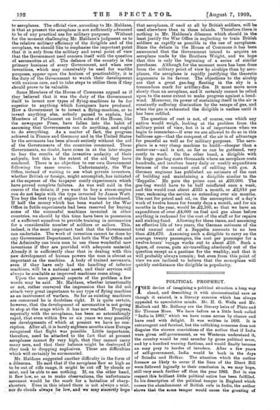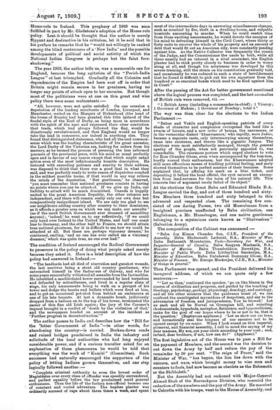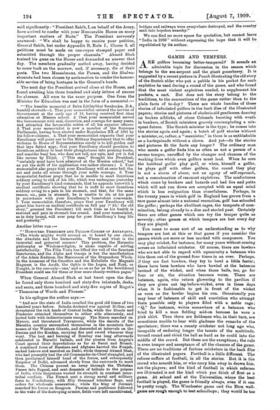POLITICAL PROPHECY.
THE device of imagining a political situation a long way ahead, and describing it with circumstantial care as though it existed, is a literary exercise which has always appealed. to speculative minds. Mr. H. G. Wells and Mr. Mallock and Mr. Bellamy are the literary heirs of Plato and Sir Thomas More. We have before us a little book called "India in 1983," which we have come across by chance and have read with delight. It was written in 1883. It is extravagant and farcical, but the rollicking nonsense does not disguise the sincere convictions of the author that if India were given self-government, as we Westerns understand it, the country would be rent asunder by gross political error, and by a hundred warring factions, and would finally become an easy prey to hordes of invaders. After a few years of self-government, India would be back in the days of Scindia and Holkar. The situation which the author foresaw as likely to occur if the lines of the Ebert Bill were followed logically to their conclusion is, we may hope, still very much further off than the year 1983. But in one respect this brilliant little political satire has been fulfilled. In, his description, of the political temper in England winch causes the abandonMent of British rule. in India, the author shows that the same temper would cause the granting of Home,rule to Ireland. This prophecy of 1883 was soon fulfilled. in part by Mr. Gladstone's adoption of the Home-rule -policy. Lest it should be thought that the author is merely flippant and destructive in his criticism, let it be said that in his preface he remarks that he "would not willingly be ranked among the blind contemners of a New India' and the possible developments of political' and social activity of which the National Indian Congress is perhaps but the faint fore- shadowing."
The year 1983, the author tells us, was a memorable one for England, because the long agitation, of the " Perish-India League" at last triumphed. Gradually all the Colonies and dependencies of the Empire had been cast off in order that Britain might remain secure in her greatness, having no longer any points of attack open to her enemies. But though most of the politicians were at one on this great and wise policy there were some malcontents :— " All, however, were not quite satisfied. On one occasion a deputation of the leading merchants of London, Liverpool, and Manchester, waited on the Marquis of Birkenhead (the head of the house of Stanley had been granted this title instead of the feudal style of the Earl of Derby, as being more in accordance with the spirit of the age) and expressed their clear conviction that trade, which had always followed the flag, would be disastrously revolutionized, and that England would no longer take the lead in commerce, nor indeed in anything else. They found that distinguished statesman, who had all the cool common- sense which was the leading characteristic of his great ancestor, the Lord Derby of the Victorian era, looking for orders from his masters, as he termed the process of perusing the less informed journals of the provincial press, with his mind as usual perfectly open and in favour of any course except that which might entail action even of the most infinitesimally humble description. He listen-rd with exceeding patience and suavity to their address, was disposed to think that there was a good deal in what they said, and was perfectly ready to write reams of dispatches couched in the mildest possible terms, if that would in any way relieve the minds of the deputation. ' But gentlemen,' he observed, 'you must remember that national greatness consists in having no points where you can be attacked. If we give up India, our liability to attack will be much diminished. Canada is happily united to the great American Republic, the other colonies are independent, and there will remain really only our own dear but comparatively insignificant island. We are only too glad to see our neighbours adding country after country to their dominions, as it affords a greater area on which we can make our assaults ' (as if the meek British Government ever dreamed of assaulting anyone) ; 'indeed,' he went on to say reflectively, if we could only hand over Ireland to the United States, and half our coast line to Germany, and the other half to France, we should attain true national greatness, for it is difficult to see how we could be attacked at all. But these are perhaps visionary dreams,' he continued, smiling, ' and no one has ever called me a visionary dreamer,' which was quite true, no one ever bad."
The condition of Ireland encouraged the Radical Government to persevere in the policy of doing what people asked merely because they asked it. Here is a brief description of how the policy had answered in Ireland :— " The landlords had all died of starvation and gunshot wounds, the last survivor being a stout old country gentleman, who entrenched himself in the fastneses of Galway, and who for some years successfully withstood all assaults from the Invincibles. He inhabited a machicolated tower surrounded by land torpedoes and defended by mitrailleuses, and lived in a regular state of siege, his only amusements being to walk on a parapet of his tower and dodge the bombs and bullets which were fired at him, and to get an occasional pot-shot from behind an embrasure at one of his late tenants. At last a dynamite bomb, judiciously dropped from a balloon on to the top of his tower, terminated the career of this fine old Irish squire ; the jury at the Coroner's inquest brought in a verdict of ' death by the visitation of God,' and the newspapers headed an account of the incident as 'Further progress in decentralization.'" The author passes to India and describes bow the "Bill for the '3etter Government of India "—in other words, for abandoning the country—is carried. Broken-down roads and ruined bridges proclaimed in India the industry and solicitude of the local authorities who had long enjoyed considerable power, and if a curious traveller asked for an explanation of these phenomena he would be told that everything was the work of " Kamiti " (Committee). Such successes had naturally encouraged the supporters of the policy of letting Indians govern themselves, and one step logically followed another:— "Complete criminal authority to even the lowest order of Magistrates over every class of offender was speedily surrendered. and perfect equality before the law proclaimed amid general enthusiasm. Then the life of the forlorn non-official became one of constant and varied adventure. The hapless planter was ordinarily accused of rape about three times a week, and spent most of the intermediate days in answering miscellaneous charges, such as mischief by fire, theft in a dwelling-house, and culpable homicide amounting to murder. When he could snatch time from these exciting amusements, he would devote the energies of his mind to defending himself in the Civil Court, where thirty or forty suits to recover the whole of his property and an amount of debt that would fit out an American city, were constantly pending against him. As the Native Collector was frequently the cousin of the Judge, and the Commissioner the uncle to both, while all three usually had an interest in a rival zemindari, the English planter had to stick pretty closely to business in order to worry along at all, and though his astuteness was developed by this severe training, still the strain on his constitution gradually told, and occasionally he was reduced to such a state of bewilderment that he found it difficult to pick out his own signature from the hundred or so executed bonds which used to be filed against him in Court."
After the passing of the Act for better government mentioned above the logical process was completed, and the last anomalies of British rule were removed, viz. :—
" 1 British Army (including a commander-in-chief) ' • 1 Viceroy ; 1 Governor of Madras ; 1 Governor of Bombay ; total 4."
The way was then clear for the elections to the Indian Parliament :—
"Babus and Vakils and English-speaking patriots of every shade of character and complexion overspread the land like a swarm of locusts, and a new order of beings, the canvassers, or in tho vernacular dialect • khanwassurs,' who rapidly, more Indico, beculno a separate caste, only intermarrying among themselves, came into existence, and throve like a gigantic fungus. The elections were most satisfactorily managed, though the general apathy of the people, when not personally appealed to, was remarkable. The enormous posters which urged electors to vote for RAM Chunder Ghose, even when accompanied by the tom-tom, hardly roused their enthusiasm, but the Khanwassurs adopted still more efficacious means of kindling political feeling, and early showed themselves to be perfect masters of their business. Some explained that, by affixing his mark on a blue ticket, and depositing it before the local official, the ryot secured an exemp- tion from land-revenue for the term of his natural life. This concrete line of argument rarely failed of its object."
At the elections the Great Babu and Educated Hindu B.A. League carried the day, and out of three hundred and sixty. five Members three hundred and sixty belonged to this advanced and respected class. The remaining five con- sisted of one daring Parsee, two old Mussulmans from a benighted province unaffected by Babu civilization, one Englishman, a Mr. Humebogue, and one native gentleman belonging to a mysterious caste known as " Shalwa.shun " (Salvation Army).
The composition of the Cabinet was announced :—
" Baba Joy Kissen Chunder Sen, C.I.E., President of the Assembly. Babu Bladeenath Laikatal, B.A., Minister of War. Babu Rathanath Mounterjee, Under-Secretary for War, and Inspector-General of Cavalry. Babu Seegyen Muchasik, BA., Minister of Marine. Babu Thumbuldoon Barrakjee, B.A., Minister of Public Works. Babu Littleybhai Smakerjee, M.A., Minister of Education. Babu Datsdeweh Demunny Ghose, B.A., Minister of Finance. Mr. Europe Mookerjee, C.J.E., B.A., Minister 'of things in general."
Then Parliament was opened, and the President delivered his inaugural address, of which we can quote only a few
sentences :—
" ' Let us then,' continued the speaker, go on like blazes in the course of civilization and progress, and guided by the teaching of theology, psychology, geology, physiology, doxology, and sociology, and all the other sciences that the quidnuncs boast of, we can confront the unmitigated myrmidons of despotism, and say to the adversaries of freedom and jurisprudence, You be blowed ! Let us each and all be Norval on Grampian hill, and rejecting rhodomontade, hyperbole, metaphor, flatulence, and hypercriticism, make for the goal of our hopes where to be or not to be, that is the question.' (Rapturous applause.) 'Lot us show our cui bone, and hermetically seal the tongues of our enemies not to be opened except by vis major. When I look round on this imperial, primeval, and financial assembly, I call to mind the saying of my dear mamma, My son, cut your cloth according to your coat ; and, indeed, dear brothers, if not, how can do?' (Applause)."
The first legislative act of the House was to pass a Bill for the payment of Members, and the second was the decision to cut down the Army by half and reduce the pay of time remainder by 50 per cent. "The reign of Peace," said the Minister of War, " has begun, the lion lies down with the unicorn, and wars, which brought money to wise men and counters to fools, bad now become as obsolete as the Behemoth or the Shibboleth."
But the Assembly had not reckoned with Major-General Ahmed Slab of the Barrackpore Division, who resented the reduction of the numbers and the pay of time Army. He marched to Calcutta with his troops, went to the House of Assembly, and
said significantly: "President Sahib, I, on behalf of the Army, have arrived to confer with your Honourable House on many important matters of State." The President nervously answered: " We shall be happy to receive your petition, General Sahib, but under Appendix B, Rule I., Clause 3, all petitions must be made on one-rupee stamped paper and submitted through the proper channels." Ahmed Shah trained his guns on the House and demanded an answer that day. The members gradually melted away, having decided to come back on the morrow, and, if necessary, die at their poste. The two Mussulmans, the Parsee, and the Shalwa- shunista had been chosen by acclamation to render the honour- able service of being hostages in the General's hands.
The next day the President arrived alone at the House, and found awaiting him three hundred and sixty letters of excuse for absence. All were to the same purpose. One from the Minister for Education was cast in the form of a memorial :-
"' The humble memorial of Baba Littleybhai Smakerjee, B.A., humbly showeth-1. That your memorialist entered the service of Government at the early age of 18, having received first class education at Mission school. 2. That your memorialist served the Government with zeal, discretion, and courage for many years, and attracted the favourable notice of all his superior officers. 8. That your memorialist is now a member of the Supreme Parliament, having been elected under Regulation XX of 1981 by his fellow-citizens. 4. That your memorialist requests that your Excellency will point out to the Military Department that to offer violence to House of Representatives surely is to kill golden calf that lays fatted eggs ; that your Excellency should proclaim to licentious soldiery to beat their ploughshares into pruning hooks, and consider busy bee, who does not toil, nor spin, and yet is fed like ravens by Elijah. (" This man," thought the President, "certainly must have been educated at the. Mission school," but as yet the drift of his application was rather obscure.) 5. Your memorialist also prays that your Excellency will at once bell the cat and make all serene through your noble courage. 6. Your memorialist further prays that he is unable to meet licentious soldiery owing to risk of his life, which was undergone yesterday by your Excellency's kind commands, that he appends herewith is medical certificate showing that be is unfit to meet licentious soldiery owing to a pain in his stomach, and that, for the same reason, iris., pain in stomach, he is unable to die at his post in accordance with your Excellency's benevolent commands. 7. Your memorialist, therefore, prays that your Excellency will grant him leave on medical certificate on full pay (" Ah ! the old story," groaned the President) till such time as his health is restored and pain in stomach has ceased. And your memorialist, as in duty bound, will ever pray for your Excellency's long life and posterity."
Another letter ran :—
" 'Honor:Ban PRESIDENT AND FELLOW-CITIZEN OF AEVAVARTA, —The whole mighty world around us is bound, by one chain, the Absolute and the Immoveable. Where and what is the immortal and primeval essence? This problem, the Hermetic philosophy or Wisdom-religion, is alone capable of solving satisfactorily. The Filia Vocis has lifted the veil of the Sanctum Sanctorum, and the Alpha and Omega is but the manifestation of the Adam Kadmon, the Macrocosm of the Stupendous Whole. In the Arcanum of the Gnostics and the Kabalists the Magnale Magnum is the Azoth, the Ophis is the Logos, and Nout, or Nought, is the one-only—one,' and so on as far as the bewildered President could see for three or four more closely-written pages."
When General Ahmed Shah at last burst open the door he found only three hundred and sixty-five inkstands, desks, and seats, and three hundred and sixty-five copies of Roget's " Thesaurus of Words and Phrases?'
In his epilogue the author says
"And now the state of India recalled the goOd old times of two hundred years before. Scindia declared war against Holkar, and devastated the rich lands of Central India, while the Blieels and Pindaries attached themselves to either side alternately, and looted both with indiscriminate energy. The Nizam marched on Mysore, and threatened Travancore, while the deceits of the Maratha country entrenched themselves in the mountain fast.: nesses of the Western Ghauts, and descended at intervals on the Deccan and the Ronkan, carrying fire and sword wherever they went. The loot and burning of Bombay was long afterwards celebrated in Marathi ballads, and the pirates from Angria's Coast' spread their depredations as far as Surat and Broach. A combined force of Russians and Afghans harried the Punjab, sacked Lahore and marched, on Delhi, while General Ahmed Shah, who had promptly had the old Commander-in-Chief strangled, and then proclaimed himself head of the forces, and subsequently Emperor of Delhi, advanced slowly from the eastwards 'to meet them. The Chinese poured an army through the Thibetan Passes into Nepaul, and sent demands of tribute to the princes of India, while Rajputana wasted its strength in constant inter- tribal cenflicts. The French sent a strong naval and military force to Pondicherry, with fifty thousand tricolour flags, and orders for wholesale annexation ; while the king of Burmith marched his forces on Rangoon. Famine and pestilence followed in the wake of the destroying armies, fields were left uncultivated, bridges and railways were everywhere destroyed, and the country sank into hopeless anarchy."
We can find no more space for quotation, but cannot leave , " India in 1983" without expressing the hope that it will be republished by its author.








































 Previous page
Previous page